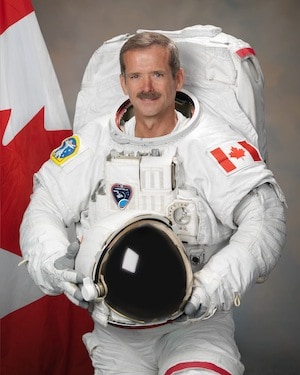Ten months back on Earth appear to have done little to diminish the popularity of Colonel Chris Hadfield, or to diminish his passion for sharing his experiences and promoting human space exploration. The Canadian astronaut — recently returned from the International Space Station, and famous for his popular tweets, photos, and videos posted during his time in space — will be coming to the U of T this Friday, March 14, to give a talk at Convocation Hall.

MEDIA PHOTO
Hadfield’s five-month-long mission saw him become the first Canadian to command the International Space Station. In addition to carrying out scientific experiments, the astronaut took on a new and somewhat unforeseen role: re-introducing the world to the wonder and beauty of space, via social media. His remake of David Bowie’s “Space Oddity” now has some twenty-one million views on YouTube, and over the course of the mission, much to his own amazement, his Twitter account acquired over one million followers. His recent talk at the Toronto Reference Library, just off campus, sold out in mere seconds online.
Since his return to earth, Hadfield has continued to educate and inspire the public, appearing at wildly popular events all across the country. His recently published book, An Astronaut’s Guide to Life on Earth, is by turns witty and thought-provoking, and tells the story of how he became an astronaut in a time when Canadians were not even allowed to apply. It is also full of anecdotes from his own experience on three separate space flights, and his work behind the scenes at NASA and at the Canadian Space Agency. As it turns out, astronauts do “sweat the small stuff,” and always prepare for the worst, both because it keeps them alive and because it helps them deal with stress. Also, becoming an astronaut apparently does not mean that the days of exams and assignments are behind you: as Hadfield describes the everyday life of an astronaut on earth, “Most days we train and take classes — lots of them — and exams. In the evenings and on weekends, we study.”
Now officially retired from the Canadian Space Agency, Hadfield will become the professor, rather than the student — he has accepted a position as an adjunct professor at the University of Waterloo, where he will be teaching classes in the aviation program starting this fall.
Although the intensive media attention that accompanied the launch and landing of his mission may have faded slightly, Hadfield’s continued popularity speaks to a renewed public fascination with the wider universe, with pushing the boundaries of human exploration, and with the daily lives and extraordinary experiences of those privileged few who have left Earth’s gravity behind and travelled out towards the stars. As Hadfield writes at the end of his book, his job was always to “support and promote human space exploration,” wherever he might be. And though his own days in orbit may be over, it is clear that he will continue to do just that right here on Earth.

